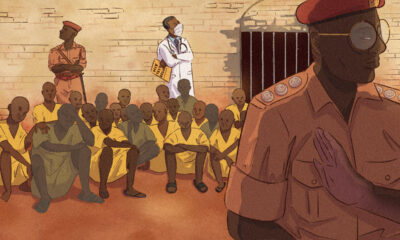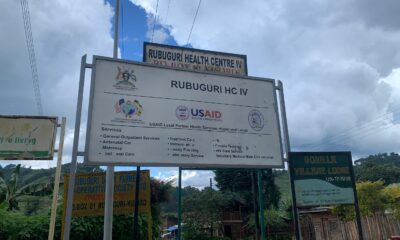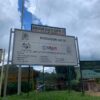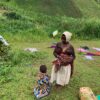Health
Uganda Confirms Ebola Virus Disease Outbreak in Mubende District
Uganda has confirmed an outbreak of Ebola Virus Disease (EVD) in Mubende District.
The confirmed case is a 24-year-old male a resident Ngabano village of Madudu Sub County in Mubende District presented with EVD symptoms and later succumbed.
According to Dr Diana Atwine the Permanent Secretary Ministry of Health, the clinical team took off samples for testing at UVRI and the results confirmed that the patient was positive for the Ebola-Sudan strain.
“The Ministry of Health and partners have dispatched a Rapid Response Team to Mubende District to support the teams in surveillance, contact tracing, and case management,” said Dr Atwine.
The deceased will be laid to rest at 2:00 pm.
Key facts
- Ebola virus disease (EVD), formerly known as Ebola haemorrhagic fever, is a rare but severe, often fatal illness in humans.
- The virus is transmitted to people from wild animals and spreads in the human population through human-to-human transmission.
- The average EVD case fatality rate is around 50%. Case fatality rates have varied from 25% to 90% in past outbreaks.
- Community engagement is key to successfully controlling outbreaks.
- Reasonable outbreak control relies on applying a package of interventions, namely case management, infection prevention and control practices, surveillance and contact tracing, a good laboratory service, safe and dignified burials and social mobilisation.
- Vaccines to protect against Ebola have been developed and have been used to help control the spread of Ebola outbreaks in Guinea and in the Democratic Republic of the Congo (DRC).
- Early supportive care with rehydration and symptomatic treatment improves survival. Two monoclonal antibodies (Inmazeb and Ebanga) were approved for the treatment of Zaire ebolavirus (Ebolavirus) infection in adults and children by the US Food and Drug Administration in late 2020.
- Pregnant and breastfeeding women with Ebola should be offered early supportive care. Likewise, vaccine prevention and experimental treatment should be offered under the same conditions as for non-pregnant populations.
Symptoms
The incubation period, that is, the interval from infection with the virus to onset of symptoms is from 2 to 21 days. A person infected with Ebola cannot spread the disease until they develop symptoms.
Symptoms of EVD can be sudden and include:
- Fever
- Fatigue
- Muscle pain
- Headache
- Sore throat
This is followed by:
- Vomiting
- Diarrhoea
- Rash
- Symptoms of impaired kidney and liver function
- In some cases, both internal and external bleeding (for example, oozing from the gums, or blood in the stools).
- Laboratory findings include low white blood cell and platelet counts and elevated liver enzymes.
Prevention
When living in or traveling to a region where Ebola virus is potentially present, there are a number of ways to protect yourself and prevent the spread of EVD.
- Avoid contact with blood and body fluids (such as urine, faeces, saliva, sweat, vomit, breast milk, amniotic fluid, semen, and vaginal fluids) of people who are sick.
- Avoid contact with semen from a man who has recovered from EVD, until testing shows that the virus is gone from his semen.
- Avoid contact with items that may have come in contact with an infected person’s blood or body fluids (such as clothes, bedding, needles, and medical equipment).
- Avoid funeral or burial practices that involve touching the body of someone who died from EVD or suspects EVD.
- Avoid contact with bats, forest antelopes, and nonhuman primates (such as monkeys and chimpanzees) blood, fluids, or raw meat prepared from these or unknown animals (bushmeat).
These same prevention methods should be used when living in or travelling to an area experiencing an Ebola outbreak. After returning from an area experiencing an Ebola outbreak, people should monitor their health for 21 days and seek medical care immediately if they develop symptoms of EVD.













































